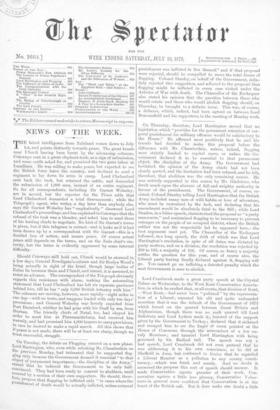On Tuesday, the debate on Flogging entered on a new
phase. Lord Hartingtou, who, even while rebuking Mr. Chamberlain on the previous Monday, had intimated that he supported flog- ging only because the Government deemed it essential "to that object of paramount importance,—the discipline of the Army," stated that he believed the Government to be only half- convmced. They had been ready to consent to abolition, until coerced by a section of their own supporters. He should, there- fore, propose that flogging be inflicted only "in cases where the Punishment of death would be actually inflicted, unless corporal punishment was inflicted in lieu thereof," and if that proposal were rejected, should be compelled to move the total disuse of flogging. Colonel Stanley, on behalf of the Government, defin- itely rejected this suggestion, and. adhered to the proposal that flogging might be inflicted in every case visited under the Articles of War with death. The Chancellor of the Exchequer also stated his opinion that the question between those who would retain and those who would abolish flogging should, on Thursday, be brought to a definite issue. This was, of course, a defiance, which, indeed, had been agreed on between Lord Beaconsfield and his supporters, in the meeting of Monday week.


































